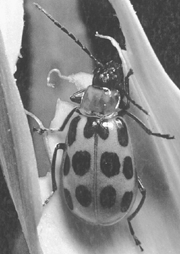

by Terry Kramer

The 1957 edition of Taylor's Encyclopedia of Gardening suggests lead arsenate as an effective insecticide to kill a wide range of garden pests and extols the virtues of DDT calling it "a spectacular success." DDT was banned in the '70s because it had spread into streams, rivers and the ocean contaminating fish, birds, mammals and people.
Today we realize the fragility of our environment and can now control almost any garden pest without using destructive chemicals.
There is more to natural pest control than the ladybugs and insecticidal soaps commonly available in nurseries. Today's common-sense efforts in controlling garden pests involve the practice of integrated pest management, or IPM. IPM is the integration of cultural methods, biological controls and botanical pesticides to control -- not eradicate -- garden pests.
With IPM, the gardener makes plants less attractive to injurious pests while at the same time fosters an environment for beneficial insects. Chemical sprays are used only as a last resort if at all.
One of the newest and most effective botanical insecticides on the market is neem. Recently approved by the California EPA, neem is derived from the seeds of the neem tree, Azadirachta indica, a native of India. Azadarachtin is the active ingredient that kills beetles, flies, mosquitoes, caterpillars, true bugs, locusts, grasshoppers, aphids, weevils, moths, roaches, bagworms, leafhoppers, leaf miners, leafrollers, gypsy moth larvae, sawflies, mealybugs, thrips, vine borers and whiteflies. Spray neem on your beans this summer to control the spotted cucumber beetle. It will kill the aphids on your roses. Neem suppresses adult feeding and halts larval development. It is available at local nurseries.
Using biological controls by introducing natural enemies of certain pests is also a safe, effective way to minimize insect damage. A recent development is the fungus Beauveria bassiana, which kills aphids, caterpillars mites, psyllids, thrips, whiteflies and spider mites. The fungus invades an insect's body by penetrating the cuticle, or "skin." Once inside the host, the fungus rapidly multiplies throughout its body, killing the insect. Sold under the name Naturalis-O, this microbial insecticide is not yet available in California. Approval is pending.
Many gardeners think of nematodes as pests, but there are beneficial ones that prey upon detrimental insects. Nematodes are microscopic roundworms. The nematode Steinernema carpocapsae is effective in killing root weevils, cucumber beetles, armyworms, beetles, root and seed maggots, fall armyworm, corn earworm and fleas in the yard. When applied to plants and soil, nematodes hunt for their prey, attracted by the carbon dioxide emitted by the doomed host. Carrying insect-pathogenic bacteria within its gut, the nematode penetrates its host and the bacteria multiply, killing the pest. The nematode feeds on the bacteria and insect's body, then mate and reproduce. A week or two later, young nematodes emerge from the insect's carcass and hunt for new hosts. If you have root weevils notching the leaves of your rhododendrons or flea infestation in the lawn, try applying Sc nematodes.
Spider mites can become a nasty pest in greenhouses, patios and plant rooms during the late summer. Chemical sprays have little effect once infestation occurs. Fortunately, spider mites can be controlled with predatory mites. For instance, Neoseiulus californicus is a mite that will prey upon the spider mite, broad mite and cyclamen mite. Predatory mites should be released at first sign of spider mite infestation.
Botanical insecticides are available at most nurseries locally. Biological controls, like nematodes and predatory mites can be purchased mail order. The California EPA offers a free pamphlet listing suppliers of beneficial organisms in North America. Write to California Environmental Protection Agency, Department of Pesticide Regulation, Environmental Monitoring and Pest Management Branch, 1020 N Street, Room 161, Sacramento CA, 95814-5604 . Telephone (916) 324-4100.
Terry Kramer is a Bayside free-lance writer and owner of Jacoby Creek Nursery.